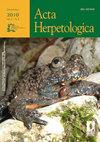Interpopulation variation in prebreeding energy reserves of plateau brown frog (Rana kukunoris)
IF 0.9
4区 生物学
Q4 ZOOLOGY
引用次数: 0
Abstract
The energy storage plays a prominent part in the life histories of many animals inhabiting cold harsh environment, thus anuran amphibians rely on larger residual energy stores from post-hibernation to cope with unfavourable weather conditions before breeding. As the habitat conditions often change in different locations, selective pressure for energy storage could also vary. However, we still have limited knowledge on whether anurans living under different environmental backgrounds would adopt suitable strategies to cope with energy demands during reproduction. Here, we examined patterns of energy storage in spring (after hibernation and before reproduction) in seven plateau brown frog (Rana kukunoris) populations with different climatic conditions in the eastern Tibetan Plateau. After removing the effects of age and body size, liver weights of both sexes and fat body weights in males were negatively correlated with temperature, suggesting that these reserves were critical for this anuran to survive through harsh and extended dormancy period under uncertain environmental conditions. Additionally, reproductive investment in both sexes could partly explain the increase in post-hibernation energy stores with decreasing temperature. Males had relatively heavier liver and fat body weights than females, indicating that males store more energy reserves for breeding activity compared with females. Therefore, we suggest that both the variation of environmental conditions and sexual differentiation of reproductive roles play a prominent role in shaping the energy allocation and reserve patterns in the dormancy and breeding of amphibian species.高原褐蛙繁殖前能量储备的种群间差异
能量储存在许多栖息于寒冷恶劣环境的动物的生活史中占有重要地位,因此,两栖类动物在繁殖前要依靠冬眠后较大的剩余能量储存来应对不利的气候条件。由于不同地点的栖息地条件经常发生变化,能量储存的选择压力也可能不同。然而,我们对生活在不同环境背景下的无尾熊是否会采取合适的策略来应对繁殖期间的能量需求仍然所知有限。在此,我们研究了青藏高原东部不同气候条件下七个高原褐蛙种群春季(冬眠后、繁殖前)的能量储存模式。在剔除年龄和体型的影响后,雌雄蛙的肝脏重量和雄蛙的脂肪体重与温度呈负相关,表明在不确定的环境条件下,这些储备对于褐蛙度过严酷而漫长的休眠期至关重要。此外,雌雄动物的繁殖投资也可以部分解释冬眠后能量储备随温度降低而增加的原因。与雌性相比,雄性的肝脏和脂肪体重相对较重,这表明雄性为繁殖活动储备了更多的能量。因此,我们认为环境条件的变化和繁殖角色的性别差异在两栖动物休眠和繁殖过程中的能量分配和储备模式的形成中起着重要作用。
本文章由计算机程序翻译,如有差异,请以英文原文为准。
求助全文
约1分钟内获得全文
求助全文
来源期刊

Acta Herpetologica
ZOOLOGY-
CiteScore
1.20
自引率
12.50%
发文量
10
审稿时长
6 months
期刊介绍:
Acta Herpetologica, a journal open to academics all over the world, offers itself as a new site for the presentation and discussion of the most recent results in the field of research on Amphibians and Reptiles, both living and extinct. The official journal of the Societas Herpetologica Italica (S.H.I.), Acta Herpetologica publishes original works – extended articles, short notes and book reviews – mostly in English, dealing with the biology and diversity of Amphibians and Reptiles.
 求助内容:
求助内容: 应助结果提醒方式:
应助结果提醒方式:


